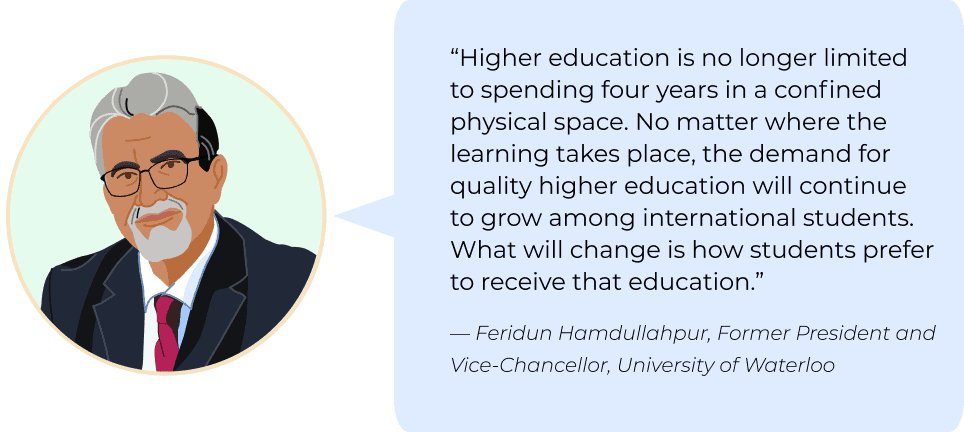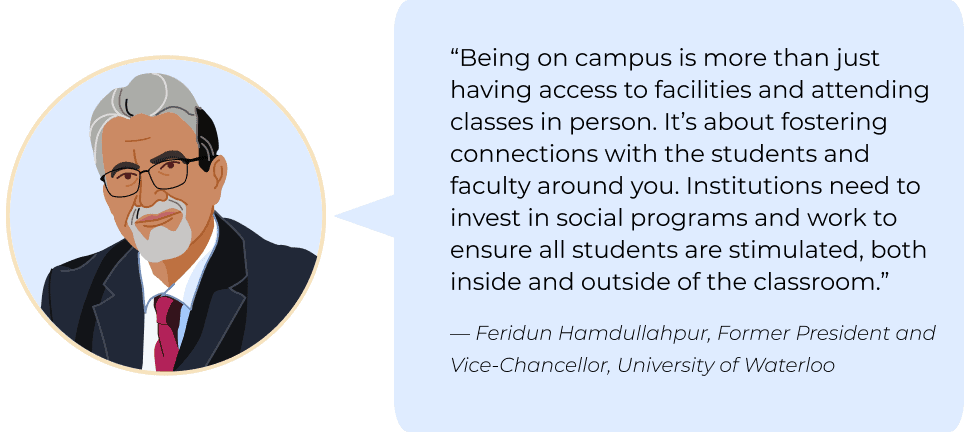The COVID-19 pandemic accelerated the expansion of international education. Backed into a corner, higher education institutions were forced to reinvent how to educate their students or fall by the wayside.
These institutions understood the assignment dropped into their laps. As campuses begin to welcome back students, there’s an understanding that things will not go back to normal. Instead, we’ve come to realize that “normal” is a living, breathing organism.
99% of higher education institutions in North America plan to incorporate some form of hybrid learning into their program offerings in the 2021/22 academic year1—that’s our new “normal.”
I recently sat down with Feridun Hamdullahpur, former President and Vice-Chancellor of the University of Waterloo, to talk about what schools need to do to adapt to this new normal. Feridun led UW from 2011 to 2021 and continues to serve the higher education community through public speaking, in addition to lending his industry expertise as a member of several higher education boards, including ApplyBoard’s Canadian Advisory Board.
Key Insights at a Glance
- 40% of students today won’t consider returning to campus to study until there are fewer or no active COVID-19 cases.
- The growth of independent institutions will provide a cost-effective option for students looking to spend less on tuition.
- Faculty remains the most important investment an institution can make in itself, as quality of teaching remains a top priority for students.
How the Landscape Has Shifted
One of the biggest learnings we’ve taken away over the past 19 months at ApplyBoard is how fundamentally different student expectations are today from what they were before the pandemic. In 2018, cost of living, on-campus safety, and finding accommodation were three of the top four concerns for international students planning to study abroad.2
Today, four in 10 prospective students say they won’t even consider attending class in person until there are fewer or no active COVID-19 cases in their destination country.3 While 54% of students elected to delay their studies in 2021 until in-person instruction was available, there’s an even larger share of students that say they need an element of hybrid instruction in their programs.

Feridun and I are totally aligned on this point. After getting a taste of remote learning themselves, or hearing about it through their own networks, students are aware of the benefits and flexibility it can provide them with.
ApplyBoard students are telling this to their counsellors. While many students want to return to campus, they wish to do so in a way that lines up with their schedule and learning preferences.
Feridun’s conversations with industry professionals globally have led him to the same conclusion.
He stresses that “institutions who wish to conduct learning dominantly in-person need to clearly articulate the advantage they provide to students from being in one geographic location.”
How Institutions are Meeting the Demands of Students
Hybrid facilitation, expansive online content libraries, and virtual collaboration tools that promote student engagement. These are just a few of the things institutions are exploring and implementing as they work to accommodate students.
Feridun and I both believe that institutions stand to gain the most when student satisfaction is at the forefront of everything they do. One of the commonly held reservations by students when it comes to remote learning is engagement. How do you offer an experience that’s akin to sitting in a lecture hall when you’re looking through a webcam speaking to a group of students you can’t see all at once?
Feridun thinks it starts with experiential learning—offering the students practical and dynamic ways to reinforce the knowledge they’re being taught.
“We will start to see many interdisciplinary programs and multi-partner education offerings,” says Feridun. “but as these offerings expand, schools must ask themselves, “How much experiential learning are we incorporating into these offerings?”
Some students want to live on campus but never set foot in a lecture hall, others want to commute into school twice a week so they can still spend time with their families, and some want to sit in the front row of a class and make eye contact with their professor.
As the delivery methods of higher education learning diversify, so do the wants and needs of international students. Schools have to innovate ways to instill a sense of community between students when they aren’t sitting in the same room.

Feridun thinks that “institutions would be wise not to put all their students in one basket. Schools that take a dynamic approach in how they deliver their curriculum will likely be the ones who see long-term success.”
The Best Use of Funding
Many international students have reported that they would consider online studies if tuition prices were 20 to 30% lower. But with the relatively modest rates of government funding received by North American institutions, cuts of these amounts are difficult to implement. So what’s the solution?
Between Feridun’s experience and what we’re hearing from ApplyBoard students, one of the biggest reasons students have a problem paying the same tuition rates to study at home is they don’t feel they’re getting the same quality of education.
“The single most important investment institutions can make is not in new campus buildings or facilities, but in hiring good faculty,” says Feridun. “A talented and diverse group of instructors is what really drives institutions to success. As we move forward, institutions that prioritize pursuing the best faculty members will be the ones who pique the interest of top international talent.”
Institutions need to upskill their faculty in ways to keep students engaged through a screen. The schools staffed with professors who can offer an engaging remote learning experience will be the schools that attract more students.
The Tuition Rate Tug of War
Due to the economic stress caused by COVID-19, more and more students are coming from disadvantaged backgrounds where cost is a massive hurdle. These students still want to pursue higher education, but it has to be affordable.
Feridun shared one of the interesting byproducts of this issue. As students seek out more affordable learning opportunities and as low government funding to public institutions persists, there’s a gap to be filled in the market. This gap can be partially addressed by independent institutions, several of which are quickly emerging around the world.
International Business University, based in Toronto, offers a 3-year Bachelor of Commerce degree that is shorter and less costly than comprable programs at private instiutions.
Independent institutions are schools that are able to offer competitive tuition rates while keeping their overhead costs low because they specialize in one field of study.
These are institutions we have on our radar at ApplyBoard as we look to expand our offerings in an effort to provide every student with a comfortable path to an education.
Looking Forward — ApplyBoard’s 2021 Trends Report
The relationship between schools and their students is probably never going to be the same. Sounds like an audacious statement, but it’s probably a true one—and I think that’s okay.
Students seek a post-secondary experience that can flex to fit their needs. To meet this need, teachers need to be fluent in hybrid course structures and experiential learning, while having an understanding of how to keep students engaged wherever they intake material from.
As long as institutions keep their fingers on the pulse of what really matters to students and work to meet their needs, international education is poised to impact more lives than it ever has.To learn about how international education will bloom over the next decade and to read more of Feridun’s thoughts on the topic, check out ApplyBoard’s Trends Report: A Future of Opportunity.
Published: November 29, 2021
Subscribe to ApplyInsights
Sign up for the latest insights on international education.
 Meti Basiri
Meti Basiri
Co-Founder and Chief Marketing Officer (CMO)
Meti is driven by the belief that education is a right, not a privilege. He leads the International Recruitment, Partner Relations, and Marketing teams at ApplyBoard, working to make education accessible to people around the world. Meti has been instrumental in building partnerships with 1,500+ educational institutions across Canada, the United States, the United Kingdom, and Australia. Working with over 7,500 international recruitment partners, ApplyBoard has assisted more than 200,000 students in their study abroad journey. Follow Meti on LinkedIn for more access to ApplyInsights and key industry trends.
FOOTNOTES:
1. Data sourced from the Open Doors 2021 – Annual Data Release, Institute of International Education (IIE).
2. Data sourced from the QS International Student Survey – 2018
3. Data sourced from the QS International Student Survey – 2021.



